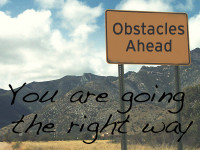There will always be those that get in the way. No matter where one is headed, obstacles are part of the journey. For the traveler embarking on an arduous task, roadblocks become a necessary nuisance. These test one’s stamina, establish fortitude, and build strength and perseverance for the long haul. In effect, they can make us better. But these can also be one’s breaking point. They sometimes demonstrate our places of weakness, and can tragically mark the point of disembarkation from the adventure. Jesus said “offenses must come, but woe to those through whom they come.”
Jesus’ heart and p urpose to equip the disciple for success is not taken lightly. His warnings of reasonable expectations prepare His people to live in the real world. The followers of Jesus Christ are called away from living in darkness to walk in the light. Among other things, this exhortation invites awareness of actual surroundings and the environment with which one is engaged. And yet His foreboding forecast of the roles of certain individuals looms as dark storm clouds do in a beautiful color-filled sky. It is truly sad that some people make it their mission to be the plight of another.
urpose to equip the disciple for success is not taken lightly. His warnings of reasonable expectations prepare His people to live in the real world. The followers of Jesus Christ are called away from living in darkness to walk in the light. Among other things, this exhortation invites awareness of actual surroundings and the environment with which one is engaged. And yet His foreboding forecast of the roles of certain individuals looms as dark storm clouds do in a beautiful color-filled sky. It is truly sad that some people make it their mission to be the plight of another.
Jesus had finished his time in Galilee and headed south toward Jerusalem. He had a mission: to save the lost souls of humanity by personally experiencing the eternal consequences of their sin. The symbolism of centuries of religious rites and sacrifices would be fulfilled as the only begotten “Son of God” would become the lamb slain for the people. Innocent blood shed to redeem the guilty: a free gift of life to be offered through the death and resurrection of their Savior. But Jesus’ tour of devotion and duty was interrupted by individuals with opposing agendas.
Chances are high they did not know they were part of an evil plot. They had probably convinced themselves of their good intentions. Hardened hearts had barricaded their souls from being touched like the others, and pride blinded them from recognizing what they saw. So all the words of Jesus, and the miracles, and the fruitful life-changes all around, would not sway the critics. They were driven by their indignation and self-righteousness. And “good people”, after all, don’t need a savior.
When they conjured their schemes in attempt to trap Jesus, the strategies seemed fool proof to them. But when foolishness is the energy behind the confrontation, this became an impossible goal. Jesus loves people too much to leave them lost without any shepherd, or with nothing but ravenous wolves to provide the food, as if being fattened before slaughter. So Jesus cuts through the fog and lets the light shine down from heaven. His words are spirit and life to those that receive, and they expose the hypocrite at the same time.
Where do we situate ourselves in the Jesus’ narrative? Are we one of the recipients of His mercy: a life under transformation by God? Or are we the obnoxious obstruction that must be avoided by the successful: the metaphorical glass in the foot of the runner that falls? Both roles are played out in this unfolding drama and each of us choose our destiny.
